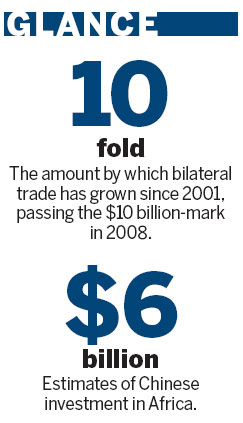China
South Africa's appeal boosted
By Qin Jize and Cheng Guangjin (China Daily)
Updated: 2010-08-25 15:46
 |
Large Medium Small |
Bilateral relations enhanced to 'comprehensive strategic partnership'
BEIJING - President Hu Jintao and his South African counterpart Jacob Zuma on Tuesday raised bilateral ties to a "comprehensive strategic partnership", opening more avenues to expand trade and strengthen relations across the board between China and the largest African economy.

Underlying the importance of the visit, Zuma, in his first state visit to China, was accompanied by 13 cabinet ministers and a 200-strong business delegation.
After 80-minute talks between Hu and Zuma, the two sides signed seven inter-governmental agreements in the fields of mineral resources, energy, environmental management and transportation.
Hu promised his African guest that China will invest more to broaden South Africa's economic appeal by promoting energy cooperation and optimizing financial services.
Zuma echoed Hu's vision of stronger ties by saying that China has become South Africa's largest trade partner and one of its key investors. Zuma also expressed his eagerness to see their commercial ties expand to other fields such as education, public health, communication technology and infrastructure construction.
Earlier in the day, the two countries signed a total of 16 business deals, including a 240 million euro ($303.6 million) loan agreement between South Africa's third-largest mobile phone operator, Cell C, and China Development Bank.
Another agreement was for South Africa's largest private health insurer Discovery to buy 20 percent of Ping An Health Insurance Co, a unit of Ping An Insurance (Group) Co of China Ltd, to jointly develop China's nascent health insurance market.
Ping An Health chairman and CEO Lu Min said the deal was worth 190 million to 200 million yuan ($28 million to $29.4 million).
Statistics showed that in the first half of this year, bilateral trade reached $10.8 billion, up an impressive 56 percent year on year.
Analysts expressed optimism in the future of China-South Africa trade ties, viewing Zuma's visit as an opportunity for China to consolidate ties with African countries.
Wang Hongyi, a researcher on African studies at the China Institute of International Studies, said China's capital and expertise are what South Africa needs in stimulating its economy and boosting employment.
Despite the overall favorable situation, business representatives also noted that there are basic problems that Chinese companies have to tackle when doing business on the African continent.
"We should respect the local laws, customs and traditions, and shoulder certain social responsibilities to have a win-win result," said Chi Jianxin, president of the China-Africa Development Fund.
Zhu Jihui, assistant general manager of South Africa Michael Diamonds, saw great potential in the country but cited the need of a suitable partner to help realize this potential.
"We will provide equipment and capital as soon as there is a proper company to cooperate with," said Zhu.
Neither is it one-way traffic. South Africans are also coming to Beijing to further boost trade between the two countries.
Jesmane Boggenpoel, an investment bank advisor from Johannesburg, is applying to local authorities to set up a company to provide advice to Chinese firms investing in her country.
"Only 40 percent of Chinese companies investing in South Africa are successful. They need advice on local policies and culture to do business," she said while taking notes with her Lenovo notepad, a common Chinese brand in her country. "Almost everything in South Africa is made in China," Boggenpoel added.
South Africa imports more from China than it does any other country and last year saw a record $2.7 billion trade deficit, a gap Zuma will be working hard to narrow.
Yang Jing contributed to this story.
China Daily